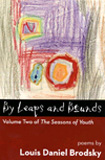Review by Howard Rosenberg
Time Being Books
10411 Clayton Road
St. Louis, MS 63151
ISBN 978-1-56809-131-0
2010, 69 pp., $15.95
www.timebeing.com
The front cover of Louis Daniel Brodsky’s sixty-third poetry book caught my attention. A child’s crayon drawing fills most of it. As I began reading the poems in By Leaps and Bounds: Volume Two of The Seasons of Youth, I realized how well its cover fit its content, for the poems are about Brodsky’s daughter, Trilogy, during her second and third years. Brodsky’s poems reflect both his joy in being a father and his insight into what its like being his daughter’s age. They also offer glimpses in Trilogy’s encounters with a pet, a playmate, a great-grandmother, and illness.
In the first volume in the series, A Gleam in the Eye, Brodsky celebrates his daughter’s life from its beginning through her first year.
In By Leaps and Bounds, Brodsky reveals his devotion to his daughter: “I sit here, in the kitchen, this snowy morning / Alone with nineteen months of Trilogy, / Watching her out of my mind’s quiet corner” (“Daddy’s Turn”). Instead of just stating his daughter’s age, he expresses it in a way that shares that they’ve been together for nineteen months, a deeper communication. Even when his eyes aren’t upon her, his mind is.
Later in the same poem are my favorite lines, which show his skill in integrating metaphor: “She opens a miniature lunchpail, without fuss, / as though it were a Chinese puzzle / Whose maze of interlocking planes she’s memorized.” According to dictionary.com, a Chinese puzzle is “anything very complicated or perplexing.” By comparing her ability to open a lunch pail to being able to solve a Chinese puzzle, Brodsky’s making a statement about his pride in his daughter’s achievement without boasting about it. It’s an approach that works.
In another poem, “Learning Languages,” he follows her verbal development. He describes her words as “inchoate crystals / Waiting for time to cast its light / On her mind’s slowly forming diamonds.” I hadn’t thought of words as diamonds; however, they have value and can increase our personal power. Words are bridges: the stronger our vocabulary, the more bridges we can build and the better we can connect with others.
I also enjoy the way he weaves words into images, as he did with this line in “Still Crawling”: “Still Trilogy moves, overland, on driving knees.” It reflects the attention he gives to her and the pleasure he gets from her.
One of the more challenging tasks for a poet is to create first lines that engage readers, that motivate them to move further along. Brodsky achieves that with opening lines such as these:
“Time is the lake in which I bathe.”
“All week, she toiled at a machine.”
“We hold hands, as the world below diminishes.”
“Alone, this Sunday morning.”
These are not first-draft lines written within brief sittings, but lines that reveal time spent on revision. They remind me of those in Robert Bly’s writings. They work because Brodsky worked on them.
The book’s final poem, “Full Circle,” was well chosen for that location. This stanza, near the poem’s end, shares his thoughts about having to reveal to Trilogy that she will no longer be the only child while revealing the difficulty he will also face:
Soon, I’ll give her the explanation
(“Mommy has a new baby in her tummy”),
But I’ll never bring myself to describe
The vast sea change coming in October,
When nothing will be the same —
Though his poems center on his daughter, they reveal much about him both as a person and a poet. He’s a person I’d like to meet, a person who evokes a sense of trust. He’s succeeded in placing fatherhood in the limelight in an era when motherhood and its joys gather much more public attention.
When my daughter was Trilogy’s age in the book, I too witnessed many of her achievements and took pride in them; however, I lacked the skill to communicate my observations as elegantly as Brodsky has. What he has done is quite an accomplishment. It not only effected my recall of my daughter’s early years, but also how those years strengthened our relationship. For his act of kindness in writing this book, I am grateful.